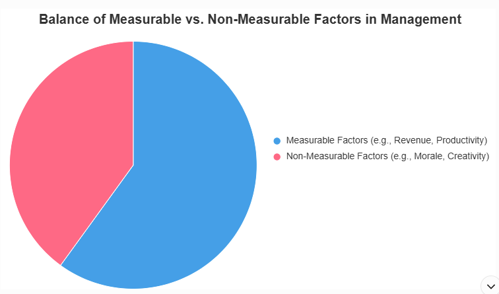
Is it true that "You Cannot Manage What You Cannot Measure"
11/06/2025
The quote “You cannot manage what you cannot measure,” often attributed to Peter Drucker or W. Edwards Deming*, underscores the value of metrics in management but oversimplifies its complexities.
While measurement is essential for tracking progress and making informed decisions, it has limitations, particularly when dealing with qualitative factors, complex systems, and human behaviour.
Critique of "You Cannot Manage What You Cannot Measure"
Below, I would like to explore why the quote is only partially correct and advocate for a balanced approach that combines measurement with qualitative judgment.
Limitations of the Quote
- Qualitative Factors
- Many management aspects, such as employee morale, creativity, and leadership, are challenging to quantify accurately.
- For example, a manager’s emotional intelligence, crucial for team cohesion, cannot be fully captured by metrics.
- Innovation and Creativity
- Excessive measurement can stifle innovation, which thrives in flexible environments.
- For instance, Google’s “20% time” policy allows employees to explore creative projects without rigid metrics, fostering innovations like Gmail.
- Complex Systems
- In complex systems, not everything can be quantified due to interdependent factors.
- In supply chain management, variables like logistics, demand, and weather interact unpredictably, making comprehensive measurement challenging.
- Human Element
- Human behaviour is often unpredictable and hard to measure.
- For example, motivating a diverse team requires interpersonal skills that defy simple metrics, relying instead on intuition and empathy.
The Role of Measurement in Management
While the quote has limitations, measurement remains a critical tool when applied thoughtfully. However, measurement alone is insufficient without analysis and action.
- Actionable Insights
- Collecting data is only valuable if it informs decisions.
- For example, in IT, measuring the actual state of devices (not just the planned state) ensures changes are deployed effectively, as seen in software patch management.
- Focus on Outcomes
- Measuring outcomes, not just activities, is key.
- For example, tracking customer satisfaction (an outcome) is more meaningful than counting the number of customer interactions (an activity).
- Balanced Approach
- Effective management balances measurable and non-measurable factors.
- The pie chart below illustrates this balance, showing that while metrics are critical, qualitative factors like morale and creativity are equally vital.
Visualising the Balance
The following pie chart highlights the relative importance of measurable and non-measurable factors in management:

Conclusion
The quote “You cannot manage what you cannot measure” is partially correct, as measurement is vital for informed decision-making; however, an overemphasis on metrics risks neglecting qualitative factors, stifling innovation, and oversimplifying complex systems.
Managers can achieve more effective and holistic outcomes by balancing measurable data with qualitative insights, as illustrated in the pie chart.
Close
Note on Attribution* - The quote’s origin is debated. While often linked to Peter Drucker, it is also attributed to W. Edwards Deming, a quality control expert who emphasised measurement but cautioned against oversimplification. The phrase may be a paraphrased interpretation of their philosophies.
The Team
Meet the team of industry experts behind Comsure
Find out moreLatest News
Keep up to date with the very latest news from Comsure
Find out moreGallery
View our latest imagery from our news and work
Find out moreContact
Think we can help you and your business? Chat to us today
Get In TouchNews Disclaimer
As well as owning and publishing Comsure's copyrighted works, Comsure wishes to use the copyright-protected works of others. To do so, Comsure is applying for exemptions in the UK copyright law. There are certain very specific situations where Comsure is permitted to do so without seeking permission from the owner. These exemptions are in the copyright sections of the Copyright, Designs and Patents Act 1988 (as amended)[www.gov.UK/government/publications/copyright-acts-and-related-laws]. Many situations allow for Comsure to apply for exemptions. These include 1] Non-commercial research and private study, 2] Criticism, review and reporting of current events, 3] the copying of works in any medium as long as the use is to illustrate a point. 4] no posting is for commercial purposes [payment]. (for a full list of exemptions, please read here www.gov.uk/guidance/exceptions-to-copyright]. Concerning the exceptions, Comsure will acknowledge the work of the source author by providing a link to the source material. Comsure claims no ownership of non-Comsure content. The non-Comsure articles posted on the Comsure website are deemed important, relevant, and newsworthy to a Comsure audience (e.g. regulated financial services and professional firms [DNFSBs]). Comsure does not wish to take any credit for the publication, and the publication can be read in full in its original form if you click the articles link that always accompanies the news item. Also, Comsure does not seek any payment for highlighting these important articles. If you want any article removed, Comsure will automatically do so on a reasonable request if you email info@comsuregroup.com.


